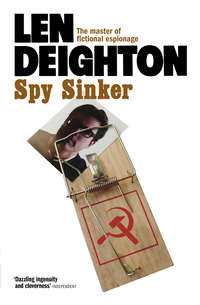
Spy Sinker
Fiona’s husband was the only person she’d ever met who completely disregarded other people’s evaluation of him. Bernard was a devoted father, more devoted to the children than Fiona was if the truth was faced. And yet he was not the unmotivated drifter that her father had warned her about. Bernard was driven by some force or thought or belief in the way that great artists are said to be, and woe betide anyone who got in his way. Bernard was not an easy man to live with. He’d been brought up in post-war Berlin – his father a senior intelligence officer – in an atmosphere of violence and betrayal. He was by nature tough and undemonstrative. Bernard had killed men in the course of duty and done it without qualms. He was well adjusted and enjoyed a self-confidence that Fiona could only wonder at and envy.
The burden of their marriage came from the fact that Bernard was far too much like Fiona: neither of them found it easy to say the things that wives and husbands have to say to keep a marriage going. Even ‘I love you’ did not come easily from Bernard’s lips. Bernard really needed as a wife some noisy extrovert like Fiona’s sister Tessa. She might have found a way of getting him out of his shell. If only Bernard could be foolish and trivial now and again. If only he could express doubts or fears and come to her for comfort. Fiona didn’t need a strong silent man: she was strong and silent herself. It was difficult for a man like Bernard to be really sympathetic to a woman’s point of view and Bernard would never understand the way that women would cry for ‘nothing’.
Lately, there had been many occasions when the complex tangle of Fiona’s working life became too much for her. She was using tranquillizers and sleeping tablets with a regularity that she’d never needed before. Bernard had found her crying several times when he’d come into the house unexpectedly. She had told him she was under treatment from her gynaecologist; embarrassed dear old Bernard had not pursued it further.
When she found herself weighed down by her thoughts, and the worries would not go away, Fiona found an excuse to leave the office and walked to the Waterloo mainline railway station. She’d come to like it. Its size suggested permanence while its austere design and girder construction gave it anonymity: a vast waiting room made from a construction kit. Coming through the dirty glass of its roof the daylight was grey, dusty and mysterious. Today – despite the rain – she had benefited from the walk from the office. Now she sat on a bench near number one platform and quietly cried her heart out. No one seemed to notice these emotional outbursts, except once when a lady from the Salvation Army offered her a chance for prayer at an address in Lambeth. Sobbing was not so unusual on Waterloo Station. Separations were common here and nowadays it was a place where the homeless and hungry were apt to congregate. London Airport was probably just as good a place to go for the purpose of weeping, but that provided too great a chance of seeing someone she knew. Or, more exactly, of someone she knew seeing her. And Waterloo Station was near the office, and there were tea and newspapers, taxicabs and metered parking available. So she went to number one platform and cried.
It was the prospect of leaving Bernard and the children, of course. They would end up hating her. Even if she did everything that was expected of her, and returned a heroine, they would hate her for leaving them. Her father would hate her too. And her sister Tessa. And what would happen to the children? She had asked Bret that, but he had dismissed her fears. The children would be cared for in the manner that her sacrifice and heroism deserved, he’d said in that theatrical style that Bret could get away with because he was so damn certain. But how sincere was he? That worried her sometimes. Sincere or not she couldn’t help thinking that her children would be forgotten once she was working in the East. Billy would survive boarding school – and perhaps even flourish there – but Sally would find such an environment unendurable. Fiona had resolved not to put her children through the sort of childhood that she had hated so much.
Конец ознакомительного фрагмента.
Текст предоставлен ООО «ЛитРес».
Прочитайте эту книгу целиком, купив полную легальную версию на ЛитРес.
Безопасно оплатить книгу можно банковской картой Visa, MasterCard, Maestro, со счета мобильного телефона, с платежного терминала, в салоне МТС или Связной, через PayPal, WebMoney, Яндекс.Деньги, QIWI Кошелек, бонусными картами или другим удобным Вам способом.
Вы ознакомились с фрагментом книги.
Для бесплатного чтения открыта только часть текста.
Приобретайте полный текст книги у нашего партнера:
Всего 10 форматов

